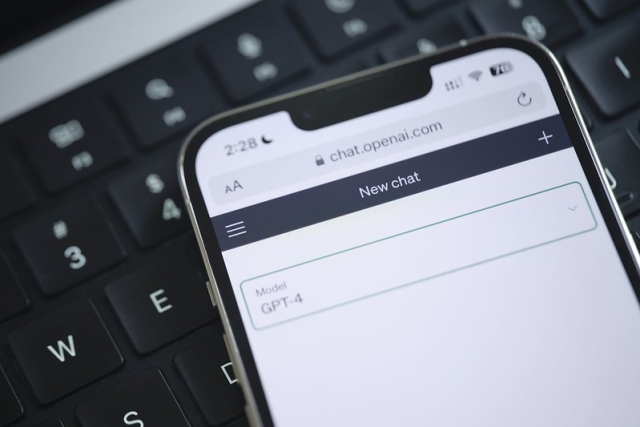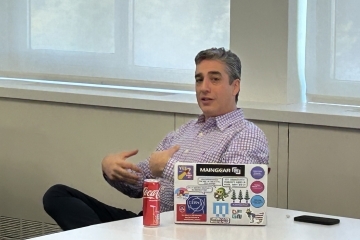
The proper integration of artificial intelligence (AI) into classroom learning brought together members of the St. John’s University community on October 23 for a lecture that highlighted the impact AI tools have on teaching models.
Most of the symposium was dedicated to debating the use of the language-model bot ChatGPT, whose emergence last year has disrupted some in higher education. ChatGPT uses language-processing models to create humanlike dialogue that can be easily crafted into essay form. Users ask the bot a question that it answers from information available on the internet, a process known as “web scraping.”
Supporters of ChatGPT say it is a valuable time-management tool whose accessibility can be helpful to students with limited resources or who face barriers to learning. Opponents suggest ChatGPT could lead to a lack of initiative and intellectual curiosity among students, who could see use of the bot as a shortcut to traditional research.
Either way, most in attendance believed ChatGPT and similar AI tools are here to stay.

“When television or the automobile developed, fundamental shifts happened—and there was absolutely no going back,” said moderator Max A. Hergenrother, Associate Dean of Technology and Pedagogic Innovation Director, St. John’s Design Factory at The Lesley H. and William L. Collins College of Professional Studies. “What it really comes down to in my opinion is how do we, living in a world where ChatGPT exists, retrain ourselves to teach people better knowing that these tools are available?”
According to Associate Dean Hergenrother, St. John’s recognizes that AI essentials are part of the toolkit students will need to be valuable to future employers. He cited data that showed ChatGPT’s growth far exceeding that of other online enterprises such as Netflix, Airbnb, and Facebook.
Introduced in November 2022, it took ChatGPT less than a week to exceed one million users. By comparison, it took Netflix 3.5 years, Airbnb 2.5 years, and Facebook 10 months to reach that target. As of late October 2023, ChatGPT had more than 180 million users.
“How do we stay relevant as educators while giving students value as they graduate?” Associate Dean Hergenrother asked. “That, to me, is the big challenge.”
The lecture, held in St. Augustine Hall, attracted more than 50 other members of the St. John’s community remotely. Most agreed AI technology is properly used as a resource tool for students—but not as a substitute for traditional learning.
ChatGPT supporters argue it can make learning more interactive and engaging for students. It also can inspire innovation among students who see it as a brainstorming partner. Some argue it can enhance students’ critical-thinking skills and cross-cultural appreciation by challenging their native assumptions.
Some supporters even see it as part of a natural technological evolution in higher education.
“In many ways, this reminds me of when online education was first introduced,” said Dharmendra Ramdehal, Ph.D., Adjunct Assistant Professor, Department of Administration and Economics at the College of Professional Studies. “I’m not sure it was quite embraced by the traditionalists. But if we wanted to stay where we were, then we wouldn’t advance as humans. My point is, here we are, discussing how to address the next new paradigm shift from an online platform.”
Related News
Q&A with School of Education Alumna Linda I. Rosa-Lugo, Ed.D. ’77ED, ’79M.S.Ed.
Linda I. Rosa-Lugo, Ed.D. ’77ED, ’79M.S.Ed., recently accepted a new role as President of the American Speech-Language-Hearing Association (ASHA). Prior to this, Dr. Rosa-Lugo has been an active...
TSOE Alumna Appointed Director of Curriculum in Amityville
Jessica Kemler ’99ED,’22Ed.D.—a double alumna of The School of Education at St. John’s University—began the new year as the new Director of Curriculum in the Amityville, NY, School District. “We are...
Alumna Celebrates Book Launch After Career Change
After developing a passion for helping the younger generation, Ashley Wilson ’14M.S.Ed. pivoted from a career in the music industry to work as an educator. She is also making her mark through her new...
